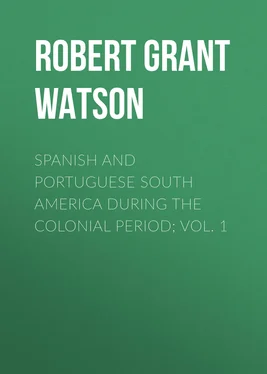Robert Grant Watson - Spanish and Portuguese South America during the Colonial Period; Vol. 1
Здесь есть возможность читать онлайн «Robert Grant Watson - Spanish and Portuguese South America during the Colonial Period; Vol. 1» — ознакомительный отрывок электронной книги совершенно бесплатно, а после прочтения отрывка купить полную версию. В некоторых случаях можно слушать аудио, скачать через торрент в формате fb2 и присутствует краткое содержание. Жанр: foreign_prose, История, foreign_edu, foreign_antique, на английском языке. Описание произведения, (предисловие) а так же отзывы посетителей доступны на портале библиотеки ЛибКат.
- Название:Spanish and Portuguese South America during the Colonial Period; Vol. 1
- Автор:
- Жанр:
- Год:неизвестен
- ISBN:нет данных
- Рейтинг книги:5 / 5. Голосов: 1
-
Избранное:Добавить в избранное
- Отзывы:
-
Ваша оценка:
- 100
- 1
- 2
- 3
- 4
- 5
Spanish and Portuguese South America during the Colonial Period; Vol. 1: краткое содержание, описание и аннотация
Предлагаем к чтению аннотацию, описание, краткое содержание или предисловие (зависит от того, что написал сам автор книги «Spanish and Portuguese South America during the Colonial Period; Vol. 1»). Если вы не нашли необходимую информацию о книге — напишите в комментариях, мы постараемся отыскать её.
Spanish and Portuguese South America during the Colonial Period; Vol. 1 — читать онлайн ознакомительный отрывок
Ниже представлен текст книги, разбитый по страницам. Система сохранения места последней прочитанной страницы, позволяет с удобством читать онлайн бесплатно книгу «Spanish and Portuguese South America during the Colonial Period; Vol. 1», без необходимости каждый раз заново искать на чём Вы остановились. Поставьте закладку, и сможете в любой момент перейти на страницу, на которой закончили чтение.
Интервал:
Закладка:
In the meanwhile Columbus was subjected to scarcely less anxiety. The non-return of his boat foreboded disaster; and he did not venture to risk his only remaining boat, on account of the heavy surf on the shore. An occurrence had also taken place which added not a little to the gloom on board of the squadron. It had been the intention of Columbus to carry Quibian’s family to Spain, as hostages for the good behaviour of the Indians during his absence. The captives, however, were determined to secure their liberty, if possible. The hatchway above the forecastle where they slept had not been fastened, as it was out of reach of the prisoners, and as some of the crew slept upon it. This neglect being observed by the captives, despair lent them ingenuity. Collecting together a quantity of the ballast, they raised a heap beneath the hatchway. Several Indians mounting on the stones, by a simultaneous effort, then raised it, violently dislodging the sleeping seamen. The Indians instantly sprang forth, and many, plunging into the sea, swam ashore. Some, however, were caught and forced back into their place of imprisonment. In the morning it was found that all the prisoners had hanged themselves.
1503.
In this state of perplexity, one brave man volunteered to bring relief to the admiral’s mind. Pedro Ledesma of Seville offered, if the boat should take him to the edge of the surf, to swim ashore through it, a feat which he successfully accomplished. He returned to the ships, to tell his commander that the Adelantado’s party were in all but open mutiny, and that they were sworn, if the admiral should refuse to take them on board, to depart in the caravel so soon as it might be practicable. Columbus, as may be supposed, was in no slight alarm for his brother, placed as he was between mutineers and savages. There appeared nothing to do but to take the whole party on board, and to return to the settlement at some future day; but the state of the weather was such as to render the execution of this plan not a little difficult. After nine boisterous days, however, the sea again became calm, and great exertion was made to get the people off ere the bad weather should return. In this emergency, the services of Diego Mendez were especially useful. Having lashed two Indian canoes together, he erected on them a raft, upon which the stores left on shore and on the caravel were towed out to the ships. In this manner, in the course of two nights and days, everything of value was conveyed on board the squadron, Mendez and five companions being the last to leave the shore.
The joy of the Spaniards was unbounded on finding themselves once more afloat. The wind becoming favourable, Columbus, towards the end of April 1503, set sail for the last time from the disastrous coast from which his descendant takes his title. 5 5 Duke of Veragua.
Instead, however, of making direct for Hispaniola , he, to the surprise of his pilot and crews, stood along the coast to the eastward.
This study of the currents had taught him that, in order to avoid being carried beyond his destined port, he must first gain considerable way to the east. At Porto Bello he was obliged to leave one of his caravels , it being so pierced by worms that it could no longer be kept afloat. Even his two remaining vessels, into which were now crowded the crews of the four, were in a very unseaworthy condition, and were only kept afloat by incessant labour at the pumps. Continuing onwards, they passed Porto Retrete and approached the entrance of the Gulf of Darien , when, yielding to the remonstrance of his captains and pilots, the admiral bade final farewell to the mainland; and on the 1st of May he stood northward in quest of Hispaniola . At this point of his career we must take leave of the discoverer of America. To pursue further the narrative of his last voyage would take us beyond the limits within which this work must be confined, that is to say, beyond the limits of South America.
Note.—The problem of rendering in English the names of places in foreign countries is one of some difficulty, and rests rather on conventionality than on principle. It is solved by different writers in different fashions. Greek purists have for some time past lost no opportunity, in writing Greek words, of substituting the original Greek K for the Roman C; but they still respect the latter in names of such places, familiarized to our ears by Scripture, as Corinth and Crete. In like manner Oriental purists, such as Sir Frederic Goldsmid and Colonel Malleson, have done their best to introduce into English literature a system of orthography as to Oriental names which is, of course, in place in the schoolroom of a professor of Oriental languages, but which has not yet made itself fully accepted by the general English reader. Those of us whose acquaintance with Indian history began with the reading of Macaulay’s Essays on Clive and Hastings, are loth to accept Pílasi for Plassey and Lakhnao for the capital of the princely House of Oude.
To look nearer home, it would be pedantic to use El Kahira for Cairo, or Dimishk for Damascus. It would be little less so, although strictly correct, to use Venezia for Venice, Roma for Rome, or Livorno for Leghorn. We have added an s —why, I know not—to the French spelling of the word Marseille . That port is as familiar in our mouths as Liverpool or Glasgow, but we invariably write it and pronounce it Marseilles. In writing Spanish or Portuguese words applied to names of places in South America, I find a considerable divergence of custom amongst authors. To take the one name of Assumption , for instance. The capital of Paraguay is so written by the Robertsons and other writers, whilst in Southey’s History of Brazil it is throughout written Assumpcion . In Washburn’s History of Paraguay it becomes Asuncion , the original Spanish name, which I see no reason to supersede. As a rule I have followed the native names of places in Portuguese or Spanish America, they being for the most part those by which they are known in England.
CHAPTER II.
THE DISCOVERY OF THE PACIFIC OCEAN
1508.
In the return of Columbus to Europe after his fourth and last voyage, King Ferdinand was roused by the accounts which he gave of Veragua into an ardent longing to possess that wealthy territory. He resolved, therefore, to found colonies upon that coast, and to place them under an able governor. But before he had proceeded to carry his resolution into practice, the great admiral was no more. In looking about for a capable commander, it might have been supposed that the king would have selected his brother, Don Bartholomew, who had accompanied him in his last voyage. Columbus had, however, left vast claims behind him, of which his family were the heirs, and which the mean and jealous monarch was unwilling to recognise. His choice of an officer, therefore, fell on the gallant and enterprising Alonzo de Ojeda, who at this period was idling his time in Hispaniola ,—his purse being empty, but his spirit as high as ever. His generous character and reckless bearing had endeared to him the veteran pilot, Juan de la Cosa, who offered him the use of his savings for the purpose of fitting out his expedition.
Ojeda, however, had a rival in the person of Diego de Nicuesa. Both were accomplished cavaliers, well fitted by their spirit of enterprise to do what men could do in fulfilment of the unforeseen and almost superhuman tasks that lay before them. King Ferdinand, being unwilling to lose the services of Nicuesa, appointed him, too, to a government; that is to say, he granted to each permission to conquer and govern a portion of the continent which lies along the Isthmus of Darien ,—the boundary line to pass through the Gulf of Urabá . The eastern portion, extending to Cape de la Vela , was named New Andalusia, and was granted to Ojeda. The country to the west, including Veragua , and reaching to Cape Gracias à Dios , was assigned to Nicuesa. Both governors were to draw supplies in common from the island of Jamaica , and each was to enjoy for ten years the profits of the mines he might discover, with the usual deduction for the Crown.
Читать дальшеИнтервал:
Закладка:
Похожие книги на «Spanish and Portuguese South America during the Colonial Period; Vol. 1»
Представляем Вашему вниманию похожие книги на «Spanish and Portuguese South America during the Colonial Period; Vol. 1» списком для выбора. Мы отобрали схожую по названию и смыслу литературу в надежде предоставить читателям больше вариантов отыскать новые, интересные, ещё непрочитанные произведения.
Обсуждение, отзывы о книге «Spanish and Portuguese South America during the Colonial Period; Vol. 1» и просто собственные мнения читателей. Оставьте ваши комментарии, напишите, что Вы думаете о произведении, его смысле или главных героях. Укажите что конкретно понравилось, а что нет, и почему Вы так считаете.












